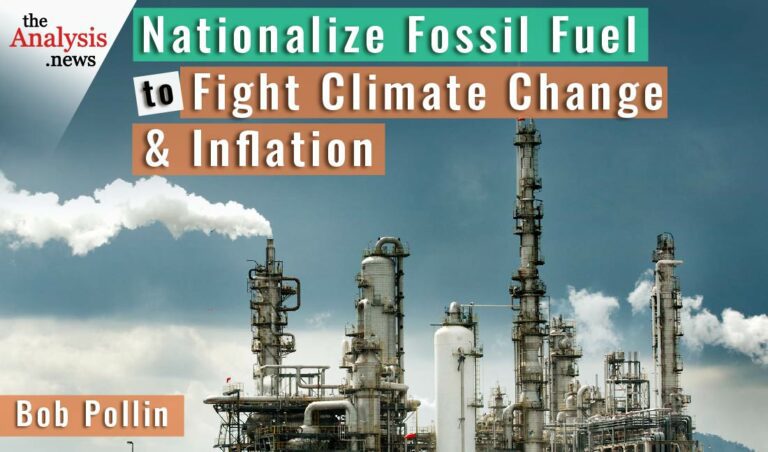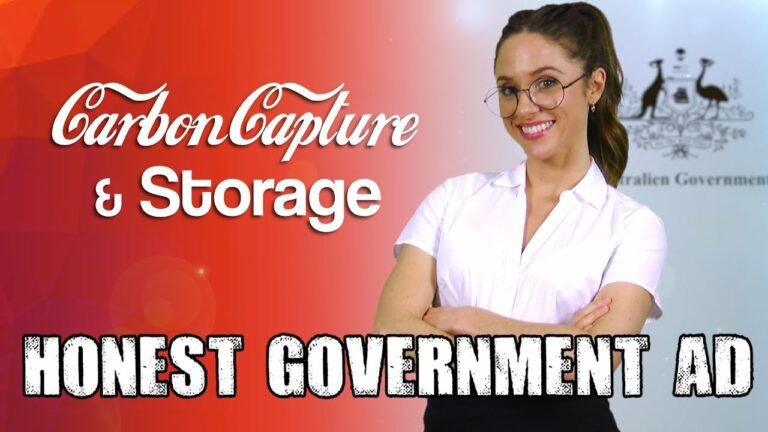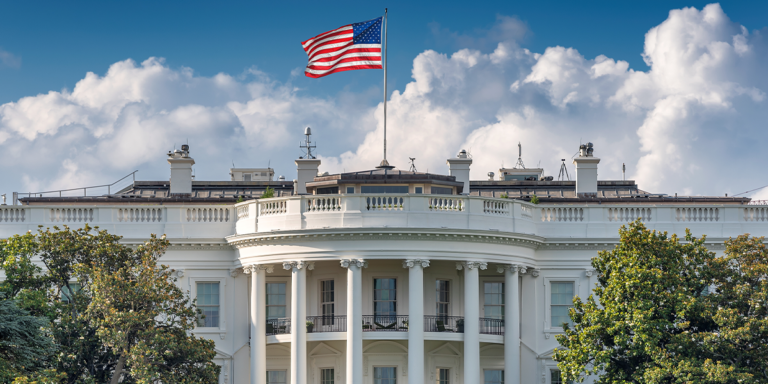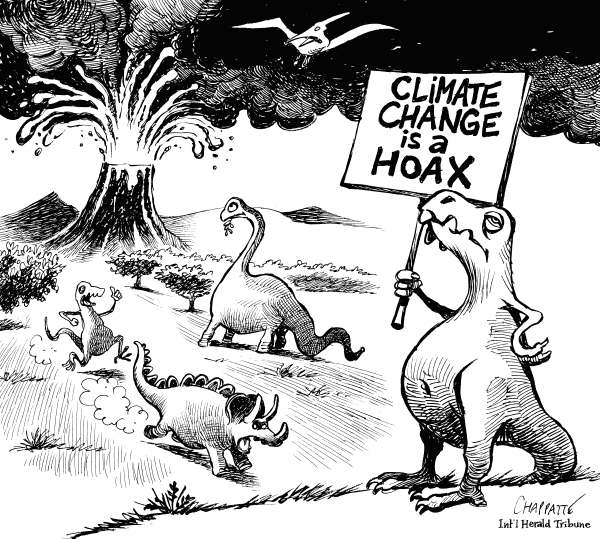This interview was originally published on August 7, 2014. Mr. Williams tells Paul Jay that to face up to the science of climate change, coal and oil conglomerates worth trillions of dollars have to keep their fossil fuels in the ground – something capitalism can’t allow.
PAUL JAY, SENIOR EDITOR, TRNN: Welcome back to The Real News Network and Reality Asserts Itself.
And joining us again in the studio is Chris Williams. He’s a longtime environmental activist and author of Ecology and Socialism: Solutions to Capitalist Ecological Crisis. He’s chair of the Science Department at Packer Collegiate Institute and an adjunct professor at Pace University.
Thanks for joining us again.
CHRISTOPHER WILLIAMS, ENVIRONMENTAL SCIENTIST, ACTIVIST, AND AUTHOR: Thank you.
JAY: So you really should watch part one, ’cause we’re going to pick up right where we left off. I guess the general question is: can capitalism provide solutions to the coming and existing climate change crisis or challenge? And as we get into this, you’re going to begin to wonder whether it has such solutions.
Thanks for joining us.
So we’re going to pick up with something Chris wrote in 2013. In September 2013, the IPCC report came out with its science report, and Chris wrote something called “Wall Street to Planet Earth: We Don’t Mind and You Don’t Matter”. In it, he writes the following:
“The IPCC report removes any ambiguity from which specific types of human activity lie at the root of these changes”.
And then he quotes the report:
“The atmospheric concentrations of carbon dioxide (CO2), methane, and nitrous oxide have increased to levels unprecedented in at least the last 800,000 years. CO2 concentrations have increased by 40 percent since preindustrial times, primarily from fossil fuel emissions, and secondarily from net land use change emissions. The ocean has absorbed about 30 percent of the emitted anthropogenic carbon dioxide, causing ocean acidification.”
And Chris goes on to write,
“Even were we to stop emitting greenhouse gasses today, industrialized human civilization based on the burning of fossil fuels for energy, has set in motion changes to the earth that are essentially irreversible and can only be measured on time-scales which are difficult to comprehend”.
So you start your article that after this report came out, you–I think you were a little tongue-in-cheek–you thought that there’d be this big collapse of the stock market in New York, ’cause everyone would bail from fossil fuels. So you went to look. And what did you find?
WILLIAMS: No impact whatsoever. When I was checking the stocks, there’d been–the news that they had to leave up to 80 percent of fossil fuels in the ground if we’re going to prevent catastrophic global warming or climate change had no impact on Wall Street trading of all fossil fuel stocks.
JAY: And you had some interesting numbers in this, the amount of fossil fuel that’s already owned by the major fossil fuel companies that’s in the ground, how much they would lose if they don’t get it out of the ground. How much was that?
WILLIAMS: It’s in the hundreds of billions of dollars and would wipe out large sections of the stock market, because so much of it is trading in what is a highly profitable industry, which is fossil fuels–oil, gas–.
JAY: In his article, Chris writes:
“Considering that a large percentage of its value is based on fossil fuel reserves, in and of itself, all of this would be very bad news for Wall Street. The stock exchanges of London, Sao Paulo, Australia and Toronto have 20-30% of their valuation from fossil fuels. As of 2011, the top 100 coal and top 100 oil corporations are collectively valued at $7.42 trillion, or half the annual GDP of the United States. If these stock markets suddenly lost up to a third of their value, the effect on the world financial system would be cataclysmic (previous largest drops, in 1987 and 2007/8 have not exceeded 20%).”
I mean, what you’re saying is if they actually accept the science here and the repercussions, we’ve got to get out of fossil fuels right away and the economy will go to hell, at least if it’s done without some real plan. But that being said, what it really means is that there’s such vested interest in the status quo by such dominant sectors of the economy that that explains a lot why we’re not seeing any change on the political side.
WILLIAMS: Yeah, I think a lot of it is down to–I mean, we’re talking about some of the largest corporations on the planet, many of them far larger than most countries in terms of their GDP. And so they clearly have an enormous influence.
I think it’s also to do with the ideology of neoliberalism, which is against government intervention for the last 30 years, which–and deregulation and privatization and so on, and reduction in state spending. And that ideology, on top of the vested interests of the corporations, has prevented any real change. And so the only change that is allowed to happen if you stick with that kind of ideology is through market regulation, so cap-and-trade schemes. That’s why cap-and-trade gets promoted, because it’s now argued that the government doesn’t have a role in regulating what the corporations do. And clearly the opposite needs to be the case. And so Wall Street is completely oblivious to the reality of the situation, as are the fossil fuel corporations.
JAY: Well, if you can get cap-and-trade actually working, in other words, for any particle of emission you’re going to plant a tree somewhere and create some oxygen, I mean, if you really could get that working, what’s wrong with that?
WILLIAMS: Well, what’s wrong with it is that it hasn’t worked. Where it’s been tried most seriously, which is in Europe, with the European trading system, emissions have been essentially unaffected by the cap-and-trade system. They’ve come down for other reasons, to do with the switch to gas, initially things like the whole economic system changing in Eastern Europe in the 1990s. But the cap-and-trade system as it’s been operating, it’s just been ripe for all kinds of scams by middlemen, brokers. The banks have made off like bandits. But the emissions, even though they’ve come down in Europe, have come down for other reasons. And that’s why they’re continuously reforming it. Lots of industries were left out, even in the reformed system, that you would want to include, like airlines, like cement production. And the cap is never low enough to have anything done about it. So carbon emissions are trading at $1, $2, $5 a ton of carbon. Nobody’s going to change if that’s the price that you pay to buy credits. And then, if you’re buying credits elsewhere and you’re allowed to pollute, then that doesn’t change the reality for the people living around the coal plant. The coal plant still operates. But they’re hardly paying anything to change. So the idea that you could then buy credits elsewhere and continue your operations, if you are a polluting entity above the cap–which is hard to be anyway, ’cause the cap is barely a cap–then there are lots of local effects, which still remain [crosstalk]
JAY: Now, the advocates of cap-and-trade–and we’ll get into a little more in detail later, but they usually point to California, and they say that the cap-and-trade program in California has been effective.
WILLIAMS: Yeah, there have been definite reductions in California. But what has happened is this problem of leakage that even the UN talks about, that California doesn’t have any coal plants, but they still use coal. It’s just outside of California. And the exports–so they’re exporting some of the emissions so that it doesn’t count for California but it counts elsewhere. And so, yes, it’s true that emissions have declined in California even as the economy has expanded, but those emissions have not [been] prevented in total; they’ve gone elsewhere, either overseas, to Mexico, or to other states in the United States. So now they’re thinking about, well, how do you expand that so that this doesn’t happen? But that keeps happening over and over again as emissions get moved somewhere else. And so the problem of leakage is a huge problem apart from the problem. I mean, what you’re doing is you’re saying, we’re going to trust the banks to come up with a scheme to protect the environment.
JAY: And they’re going to financialize without having profit as their primary objective, which is not possible.
WILLIAMS: Right. I mean, and what we’re doing is–yeah. What we’re doing is effectively turning another sector of the environment, now the air, the atmosphere itself that we breathe, into an exchangeable commodity. And so it now becomes a profitable thing to trade in the atmosphere. And from a philosophical perspective, is that where we want to go?
JAY: Well, if one forgets the philosophical side, if you’re just really pragmatic and say, okay, anything at this point that’s effective is a good thing, is there a way to structure this in some way that makes use of the for-profit mechanism to deal with the threat?
WILLIAMS: I mean, I think there’ve been a number of different proposals. James Hansen came with a–basically, up with the idea that things would be taxed at source. So wherever the mine is or wherever the power station is, they would get taxed for that pollution. And the money that was raised would go back as a rebate 100 percent to the American population in this example. And so that is one proposal that I think is worth considering.
But if you’re talking about giving money back to ordinary Americans from the corporations, that would meet enormous political resistance, which takes us back to the need for some kind of political reorientation of social power in the country to even get something like that. I mean, I think fundamentally what we’re talking about is the need for government to set targets and regulate the coal industry, for example, out of existence, because the real war on coal, as was pointed out by Paul Krugman recently, is not by environmentalists; it’s by the coal corporations. They’re the ones who are cutting back on coal miners all the time and have been doing so for a whole number of years. And it’s obviously a dangerous job. We would want to employ those people in well-trained other positions. And I think that those things would exist when you think about the infrastructure in the United States that just got a D+ from the Corps of Civil Engineers.
…
JAY: So in Chris’s piece that I’ve been referring to, he writes:
“However, what really hammered the last nail into the coffin labeled ‘fossil fuel corporations’ and presumably stock markets the world over, and the reason I was so avidly fixated on the opening of Wall Street, was for the first time, the IPCC report put a budget on carbon.
“The report indicated that, if we are to have any chance of staying below the crucial limit of two degrees Celsius of warming, we could only burn a maximum of 800-880 gigatonnes of carbon (GtC). As we have already set fire to 531 GtC as of 2011, and added that carbon to the atmosphere and oceans, we’re only left with approximately 350 GtC leeway.
So a little further down, Chris writes:
“How does that number compare to how much we’ve discovered and as is calculated in the reserves of fossil fuel companies and those held by governments, and hence the basis for their valuation on stock markets around the world? According to the Carbon Tracker Initiative report cited above, that number is 2795 GtCO2, 65% of which is from the most abundant and polluting source, coal.
“The portion of reserves controlled by the top 100 coal and top 100 oil and gas companies is 745 GtCO2.”
So we only have 350 gigatons that we can put in without going past this most dangerous point. What does that mean in terms of the value of what these companies have? And more importantly, as James Hansen’s pointed out, this is very much about coal when it comes to the United States.
WILLIAMS: Yep. Coal–the United States has been described as the Saudi Arabia of coal. It has enormous amounts of it. And coal use domestically has gone down, which is actually why the United States’ emissions have also decreased. And we’re already halfway to the emission limits that Obama just announced. So then it’s not very ambitious, actually, at all.
But as coal is the most polluting source of carbon, that’s the thing that we need to get rid of most urgently. I mean, there are a host of other reasons, to do with acid rain, but also to do with the health implications. The National Institute of Science did a study, and they found that if we closed all the coal plants we would save about ten times the amount of money to pay a lifetime pension to all of those coal miners, in terms of the health care savings that would then amount. So we could more than afford to close all the coal plants, re-employ or pension off all of the coal miners, retrain them, whatever we wanted to do, and save an enormous amount on respiratory ailments, hospital visits, asthma-related causes of health problems, because the reality is that coal is not just about CO2 emissions; it’s about all of the acid rain that is caused, and also all of the respiratory problems that are caused for humans and other animals. So we need to really be talking about closing down the coal plants, because science is saying we need to go down by 5 percent emissions in every year, basically, from now on and in order to eradicate all emissions from energy and transportation. And so we need to be–and the longer that we wait to do that, the harder and harder it becomes. And the latest UN report said it’s only going to affect the economy if we make these changes by about 0.14 percent. And so actually this would create enormous amounts of well-paid jobs for a whole new energy infrastructure.
JAY: But we don’t do that, because, so far at least, we’re wedded to this market mechanism.
WILLIAMS: Correct.
JAY: But in that context, even though I know you and a lot of scientists and environmentalists don’t think what Obama did is enough or effective, didn’t at least he open the door that it’s actually a regulation, it’s not a pure finance mechanism? Because now you can have debates at the state level how to meet the bar of the federal law. And, of course, I think he perhaps presupposes that’s going to be a financialized cap-and-trade scheme. But it has opened the door that this bar could be met in other ways. You don’t have to use financialization.
WILLIAMS: No. I think, I mean, the good thing is you don’t need any more new laws. You actually don’t need to pass anything through Congress.
JAY: Yeah, just the EPA regulation.
WILLIAMS: Right, just the EPA regulation.
JAY: That’s what I’m getting at. He’s used a kind of government intervention which isn’t pure market mechanism.
WILLIAMS: Right. In the same way that the EPA regulates arsenic, for example, or mercury they now have to regulate CO2.
JAY: Which was even a Supreme Court decision.
WILLIAMS: Exactly, in 2007. And so in many ways the road is clear, right? The EPA has to regulate these things as a–carbon dioxide as a toxin, harmful to human health. And so they should be doing that.
The problem is that the limits that have been set or the level of ambition is very low. And, actually, because it’s averaged across states, there are some states, because they’ve got more of a mix of different fuels and they’re not coal-heavy, the onus is actually on those kind of states, rather than the coal states, to make reductions. So if you look at the whole plan, some of the coal states could actually increase their emissions slightly from now till 2013, whereas other states have to radically reduce by more than 30 percent in some cases. And so I think this cap-and-trade may be part of that. It hasn’t worked anywhere else so far, so I’m not sure why we would be doing that.
JAY: And what about a carbon tax?
WILLIAMS: I think it has to be something whereby the government actually regulates and comes up with, just like Germany did, saying, well, we’re going to close all our nuclear plants by 2022 as a result of Fukushima. How are we going to replace that electricity? Let’s start planning now and let’s invest 25 billion dollars/euros in a new energy infrastructure to get that going from wind and solar.
JAY: Germany was able to do that within the capitalist system.
WILLIAMS: Absolutely. I think that there are real solutions that can be fought for under capitalism. It’s not impossible to reorient things. But I think ultimately we need to be talking about a different kind of system, because, one, the political and economic forces arrayed against this are so enormous that we’re going to need a huge social movement to make real change anyway.
But also there’s this dependency within capitalism on constant growth, right? The economy has to always grow. And you can’t do that on a finite planet. And now we’re finding the limits of what the planet can absorb in terms of the amount of economic activity, not just in terms of energy, but in terms of other attributes of the economy, such as water, for example. And so it’s really about how do–capitalism cannot survive without growing, which means that we can’t retain capitalism if we want to retain a liveable planet. And I know which most people would choose. So capitalism’s pretty short-lived as a social system. And so there must be other alternatives that we can look to that would be more socially just and more ecologically sustainable.
JAY: Okay. We’re going to continue our discussion with Chris Williams and the climate change crisis on Reality Asserts Itself on The Real News Network. Please join us for the next segment.
Never miss another story
Subscribe to theAnalysis.news – Newsletter
“Chris Williams is a longtime environmental activist and author of Ecology and Socialism: Solutions to Capitalist Ecological Crisis. He is a professor of physics and chemistry at Pace University and chair of the science department at Packer Collegiate Institute, and a regular contributor to the International Socialist Review.”










